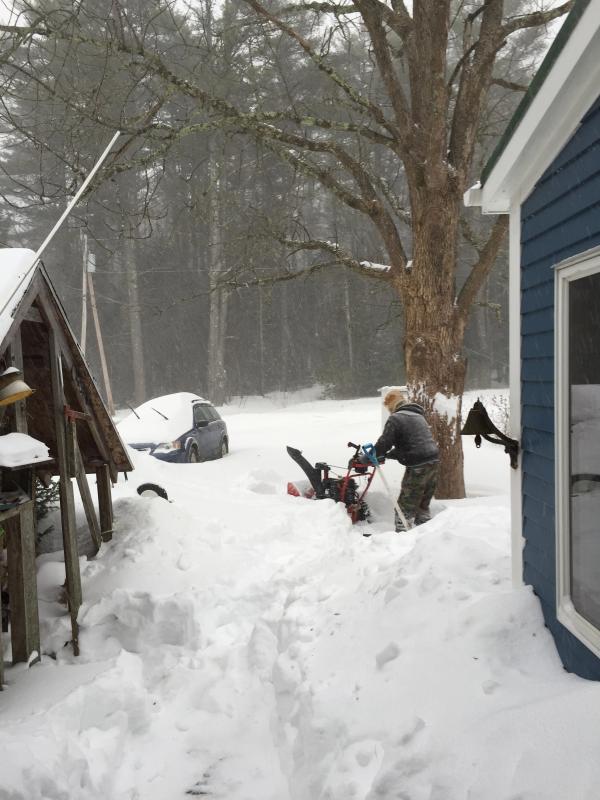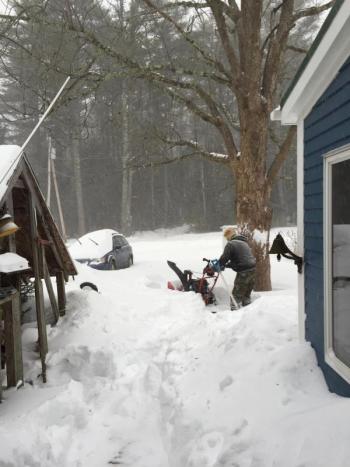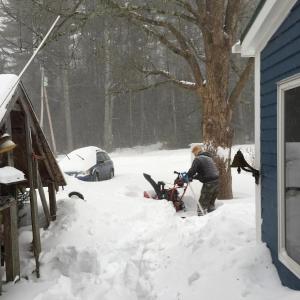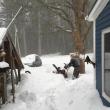This Week in Lincolnville: Nothing is as Permanent as Change
I made a decision when I was 23 years old to move to Maine, based on a childhood dream to live in the woods. And I’ve never once regretted or even imagined a different life, a life lived basically out of the main stream of what’s become the twenty-first century.
Changes which were inevitable, some subtle, some overwhelming, remind me of my father’s trajectory. Born in 1905 he grew up in a house lit with gas, on a street where horse-drawn vehicles rumbled by. Orville and Wilbur Wright made the first flight a mere three years before he was born. He saw two world wars, a moon landing, and the birth of three grandchildren, then missed meeting the three born to his son.
He also completely missed what seems like the biggest change yet to come: the digital age. More subtle, but arguably more significant are the changes coming to our earth at a pace that seems to be accelerating.
Think of the changes to our small, 39-square-mile town. The annual misery of black flies, which sent me to the ER the first spring I was here, seems trivial compared to ticks which bedevil us nearly year-round, and which have the potential of carrying a deadly disease. At least two people in the Midcoast have been infected with Powassan; one died and the other suffered disability for years. A friend who frequents the woods is still picking ticks off her body in mid-December.
Animal populations are shifting. Turkey vultures showed up a couple of decades ago, along with a decline in songbirds. Wally always said there were no mourning doves here in his childhood. Where are the flocks of evening grosbeaks we used to see?
Ducktrap, once carpeted with mussels at low tide, is now barren. The periwinkles and sea urchins seem to have gone missing as well. Isabel Ames, the little girl who grew up on the shore, rowing out to catch a halibut or a haddock for her family’s dinner, would come up empty today.
Remember coydogs? Coyotes were nearly unknown in these parts, and when they did start to show up it was assumed they’d somehow mated with dogs. Today they’re everywhere, a far cry from those earlier, scrawny critters, hefty and healthy-looking with thick coats. Thanks to trail cams we can now catch a glimpse of them along with the otters and beavers, foxes and fishers, even bobcats, all passing through and amongst our yards and forest.
CALENDAR
TUESDAY, Dec. 20
Library open, 3-6 p.m., 208 Main Street
WEDNESDAY, Dec. 21
Library open, 2-5 p.m., 208 Main Street
FRIDAY, Dec. 23
Library open, 9-noon, 208 Main Street
SATURDAY, Dec. 24
Christmas Eve Services
4 p.m., United Christian Church
6 p.m., Bayshore Baptist Church
SUNDAY, Dec. 25
MERRY CHRISTMAS EVERYONE!
EVERY WEEK
AA meetings, Tuesdays & Fridays at noon, Community Building
Lincolnville Community Library, For information call 706-3896.
Schoolhouse Museum closed for the winter, 789-5987
Bayshore Baptist Church, Sunday School for all ages, 9:30 a.m., Worship Service at 11 a.m., Atlantic Highway
United Christian Church, Worship Service 9:30 a.m., 18 Searsmont Road or via Zoom
Eagles were such a rarity, back in the day (my day) that people marked the time one flew over this or that family event – a wedding or a death, for example. Today they’re almost as common as ravens, at least near the shore, one result perhaps of the banning of lead sinkers and of DDT.
A new, prolific weed pops up in the garden every year or two, it seems. Crabgrass and garlic mustard are two that have invaded my garden recently. Bittersweet with its handsome orange berries is slowly strangling many a tree in our town. If you’re accustomed to its twiggy branches twined into a wreath, you’ll likely be shocked to see the thick trunks of the mother plant encircling its “host”.
According to the Maine Forest Service, beechleaf disease, is caused by a “microscopic roundworm . . . While mature beech trees are less often affected, they can be significantly stressed by BLD, and in some cases killed. Impacts to understory beech can be severe, leading to tree death in 3 to 5 years.” It was first detected in Maine in Lincolnville in 2021. Rosey Gerry says you can see dead and dying beech trees on Hope Road not far along from the Town Office.
Witches broom is a pest that infects high bush blueberries and balsam firs, Dutch elm disease that wiped out the majestic street trees lining the Center and Beach, and the newest threat to our trees – oaks, apples, and others – the brown tail moth. The woolly adelgid, an aphid type insect, is invading our hemlocks, and emerald ash borer is on our doorstep.
A life lived in the woods indeed.
Wally and I settled into this house a mere decade after it got its first upgrade from a 19th century farmhouse; i.e. its first bathroom, drilled well, flush, and furnace were added in the 1960s. It even had aluminum storm windows, the kind you slide up and down each season. I assume electricity had been installed in the 1930s along with other houses in town, part of the Rural Electrification Act of 1936.
Not much has changed in this neighborhood as it borders the State Park, but around town, wherever a house could be built it seems it has been. But even so, most of us are still in the woods.
And the more things change, the more they stay the same, as a French writer wrote in 1849. The younger generation still drives its parents crazy, just as ours did, just as our parents did theirs.
Insects, plants, animals – fin, fur or feathered, as well as people, adapt to the changes in their wider world, be it a climate that’s warming or a digital takeover of information. And species-wide, some thrive, some just survive, and some die out.
Christmas Eve Services
United Christian Church is holding their Christmas Eve service Saturday, Dec. 24 at 4 p.m. This is a family-centered service with all welcome! There will be no service Christmas morning or New Year’s morning; regular 9:30 a.m. worship resumes Jan. 8.
Bayshore Baptist Church will hold its Candlelight Christmas Eve service at 6 p.m. No Sunday School Christmas morning, but regular 11 a.m. worship service will be held.
























